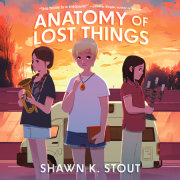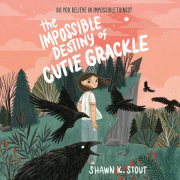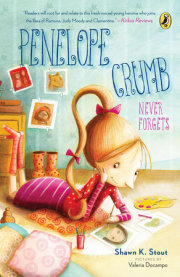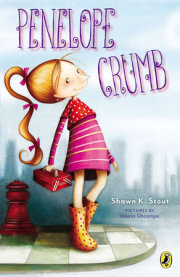A summer spent without a favorite sister could not be called a summer at all. This was a firm belief held dear to the two Baum sisters. Well, that’s not exactly true. It was a firm belief held dear to one Baum sister: Frankie Baum. As Joan, the just-barely-older of the two, was about to spend the summer months with their Aunt Dottie by the lake in rural Pennsylvania, Frankie would be left behind in their small apartment in Hagerstown with nothing to do but add to her scab collection. And honestly, what good was collecting scabs if you didn’t have anyone around to admire them?
And speaking of being honest, Joan was not very. Not really and truly. Sure, Joan was unhappy about going away from her favorite sister for these many months, but just because the two would be separated didn’t mean she was going to declare that it was going to be no summer at all. Heavens, no. There was a lake at Aunt Dottie’s, let us not forget. Besides, Joan would have her own room at Aunt Dottie’s, in particular her own bed, and that excited her even more than the lake. But Joan, who was quite sensitive to others’ feelings and who could call up a fresh batch of tears just as easily as her favorite actress, Shirley Temple, made a point of adding some gloom to her appearance so as not to cause her beloved younger sister any further distress.
There was enough distress in the world these days, anyway. Trouble was brewing overseas, a continent away. The kind of trouble that Frankie and Joan didn’t really understand, but from Mother and Daddy’s whisperings of war, of the Germans, and yes, of death, they felt something awful was coming, like a shadow that was going to one day, perhaps soon, reach across the ocean and block out the sun.
Are you frightened? You should be. War is a terrible thing. But let’s not get ahead of ourselves. The war has not yet begun, not officially. There are other troubles to speak of first, serious ones that lay heavy on the heart. And so, our story begins with a good-bye.
Chapter 1According to Frankie Marie Baum, being Number Three in the family was a lot like Mr. Wexler’s fried pork and sauerkraut sandwiches. They both left an awful taste in her mouth.
Oh, pardon the interruption, and right at the start of the story, too. You now must be wondering how Frankie Baum is Number Three when only
two sisters have been mentioned thus far, Frankie and Joan. There was indeed another sister, the eldest one, Elizabeth. She was often called Princess by Mother and Daddy and was practically without a fault, at least to their eyes, which may help you to understand why she was not mentioned before now. There, that’s taken care of. Those were the
three Baum girls: Elizabeth, Joan, and Frankie, in that order. Now back to the story.
“Number Threes aren’t so bad,” Joan told Frankie. The two were sitting together on the side porch of the Baums’ first-floor apartment.
“Prove it,” said Frankie, folding her arms across her chest. Joan was a Number Two, after all, and there was a mighty big difference between a Number Two and a Number Three. You might not have known it to look at them, but Frankie swore there was.
Joan thought for a moment while Frankie waited, poking her in the ribs every now and then, until she came up with some examples—three, actually—to serve as proof: “Okay, I’ve got it,” said Joan, pointing her finger up at the tiny piece of sky that was visible above the alleyway between their building and the one next door. “For one thing, three is the first prime number.”
“Big deal.” Frankie didn’t care so much for mathematics or for this example. She fingered her skate key around her neck. “What else?”
“The Holy Trinity,” said Joan, matter-of-factly.
Frankie nodded. There was no debating that one.
“And,” said Joan, giving her sister a gentle nudge with her elbow, “there’s Judy Garland. She’s the youngest of the three Gumm sisters, you know. Just like you.”
Frankie knew what she was doing. Joan always tried to make her feel better, usually by bringing up Judy Garland, the singer and actress Frankie most admired. Much of the time it worked. But not today. Frankie didn’t look at her. She just ran her fingernail along the chipped paint of the iron porch railing and watched the specks fall like black pepper to the cement below.
Joan tried again. “I’m only going to be gone until August, Frankie. Just like Elizabeth was last time. And next year, it’ll be your turn to spend the summer with Aunt Dottie.”
Frankie shrugged. Always the last to do everything. For once, she wanted to have a go at being first. That’s Just Not How the World Works was what Mother said whenever Frankie asked why she couldn’t do something before Elizabeth and Joan. Not fair, was what she said in return, which wasn’t much of an answer, but who was she to change the world?
“Anyway,” Joan said, “you’ll be having so much fun right here that I’d bet you ten cents you won’t even miss me.”
Frankie rolled her eyes and muttered, “I swear.”
“Don’t you let Mother hear you say swear while I’m away,” Joan said, giving Frankie’s arm a pinch. Joan was twelve. Only one year, three months, and five days older than Frankie, but Frankie swore sometimes she acted more and more like Elizabeth. That was a Number Two for you, always ready to take over the Number One spot.
Frankie looked right at her. “But you’re leaving me alone with Mother and Daddy and boring old Elizabeth, who’d rather have her nose in a book than race me down to Mr. Wexler’s Five and Dime on skates. What fun will there be?”
Joan gazed up at the sky, way above the chimney tops, as if the answers of the summer, and maybe of the world, might be floating around somewhere up there. While she was looking, she couldn’t help but let her mind drift to wide open spaces, and Aunt Dottie’s lake, and about how soon she might hoist herself upon a raft and float on it. Float and float and float away.
She floated for quite a while, too. Or her thoughts did, anyway. Right up there with the clouds. Joan was really good at thinking about what could be and forgetting about what was. Frankie was just the opposite. “Joanie!” Frankie said, knocking her own knee against her sister’s.
“What?” It took Joan a few moments to realize she was still there, sitting under the roof of their side porch, lakeless. It took her a few moments more to realize she was smiling. (The confused look on Frankie’s face, followed by disappointment, gave it away.) And it took her only a few moments after that to quickly pinch the skin on her calf, just under the hem of her cotton dress, hard enough to make water fill her eyes. Shirley Temple certainly would’ve been proud.
“Never mind.” Frankie wanted to tell Joan that she hated her for leaving. She wanted to. But she didn’t. Joan’s big green eyes, same as Grandma Engel’s, cooled Frankie’s fiery mood like a bed of grass under hot bare feet. So Frankie spit on her hand and stuck it out. “You’re betting ten cents that I won’t miss you?”
Joan eyed Frankie’s hand. She nodded. “Ten cents.” Then she spit on her own hand and they shook.
Frankie knew darn well that she would win it, Joan wouldn’t pay it, and Frankie wouldn’t take it even if she did. Joan grinned and then wiped her hand on her dress. She knew it, too.
Daddy’s car growled to a start in the garage behind the apartment and Frankie knew he’d be out front to fetch Joan any minute. Frankie’s stomach felt like she’d eaten a pound of raw potatoes.
“I better go get my suitcase. Daddy wants to be back before supper.” Joan sprang to her feet and pulled open the screen door. Before ducking into the kitchen, she asked “You’re gonna see me off, aren’t you, Frankie?”
Frankie looked away, squeezing her skate key tight in her hand, and then nodded.
The door slammed shut and Frankie wiped her eyes on her dress sleeve. Inside, she could hear their two cousins, Ava and Martha. “Where’s Frankie?” they asked Mother, then Grandma Engel, then Elizabeth. Frankie didn’t know why, but right then she didn’t want to be found. So she crawled into her secret hiding spot between Mother’s wringer washer and a stack of milk crates. And just listened.
Ava and Martha called her name over and over again until Frankie could hear Mother tell them that they were wearing at her nerves and to take their search party outdoors. The screen door creaked open and slammed shut. Footsteps wandered around the porch and then stopped real close by. Frankie peered through a crack in a milk crate stacked three high, but it was as dark as a can of Daddy’s Shinola shoe polish.
Frankie stayed real quiet, and she could hear whispers and giggles and heavy breathing. Frankie wished she could see who was with them. Only Joan and Bismarck knew about her hiding spot, and Joan wouldn’t dare tell.
Something nudged the crates and whimpered. And then Frankie knew the identity of the fink who had betrayed her. “Shh. Bismarck,” Frankie whispered. “Shoo.”
But that only made him more excited, and he started barking and whining. So Frankie had to give up before everybody came complaining about the noise and found her secret place. She slid the milk crates away until there was enough room for her to crawl out. When Bismarck saw Frankie, he barked and licked her face like he’d just dug up the moon after years of forgetting where he had buried it.
“Good dog,” said Ava, scratching behind his ears. She pulled a piece of bologna from her dress pocket, tore off a chunk, and gave it to him. Ava was just a year younger than Frankie but a good deal shorter and more stout. She was bossy, to the point of rudeness, and spent most of the time in some sort of punishment or another. The only outcome of these punishments, which were intended for reformation and rehabilitation, was that Ava emerged even more of a conniver, fiendishly plotting her next offense to top the one that came before. Don’t let the mop of curls on her head fool you; Ava was well on her way to becoming a criminal mastermind.
“Traitor,” Frankie said, giving Bismarck a sideways glare. “I should have known you could be swayed to the other side by cold cuts.”
“Let me have a bite,” said Martha, who was wearing this morning’s breakfast on her chin and dress: some type of red jam and a dribbling of soft-boiled eggs. Martha was seven, an accomplice-in-training.
Ava raised her eyebrows and said, “Only if you do a trick first.”
“Like what?”
Ava winked at Frankie and then said, “Martha, go find Joanie.”
“All right,” said Martha, looking as eager as Bismarck. She raced back into the apartment. But before the screen door smacked closed, Ava tossed the rest of the bologna into Bismarck’s open mouth.
“Don’t worry,” Ava told Frankie, “your secret hiding place is safe with me.”
“What about Martha?”
“Oh don’t worry about her,” she said. “That’s what’s good about having a little sister. They do whatever you tell them.”
Daddy’s car horn tooted twice, and Frankie left Ava and took off up the alley. Bismarck passed Frankie before she got to the corner of the building.
When Frankie reached the street, Daddy was opening the door to his blue Studebaker. Bismarck jumped in the back. “Not this time, boy,” said Daddy. He snapped his fingers and Bismarck leaped out. That shepherd dog was smarter than most people you came across in an average day, Daddy always said. And it was true. He had found Bismarck in a ditch alongside a Texas road, on one of his business trips. The pup had been no more than a few weeks old, and there was something about his eyes, Daddy had said, how they looked closer to human than animal, and how they watched Daddy as he spoke, intent on every word, as if Bismarck seemed not only to hear but
understand.
Unable to leave him behind, Daddy stowed the pup in his carrying case and brought him home for Mother. Daddy was always doing things like that, hoping that one day Mother would learn to like surprises.
“Joan, let’s get this show on the road,” said Daddy, leaning his hand against the back window of the car.
“Patience now, Hermann,” said Mother. She, Joan, Grandma Engel, and Elizabeth were in a huddle on the front stoop, and although Frankie couldn’t hear what Mother was saying, she’d bet a nickel that Mother was reminding Joan for the umpteenth time to mind Aunt Dottie and be polite and help with chores and most of all, not get into trouble.
When they finished, Daddy took the suitcase from Joan. She jumped off the stoop and then hurried over to Frankie. “Don’t let Bismarck get too used to my side of the bed,” Joan said. “And don’t let Ava use my skates. She’ll break them.”
“All right.”
“And remember the right way to hook up Dixie to the cart if you take her out.”
Frankie nodded. “I know, I know, she’s my pony, too.”
Joan went on. “And give her enough hay and fresh water. Not too many oats. It makes her lazy. And don’t forget to practice your skin-the-cats on the . . .”
“Stop bossing me so,” Frankie told her.
Joan pinched Frankie’s arm and grinned. Frankie pinched her back.
When Daddy pulled away from the curb, Frankie waved once. Then she looked away so she didn’t have to watch Joan disappear down Antietam Street.
Copyright © 2016 by Shawn Stout. All rights reserved. No part of this excerpt may be reproduced or reprinted without permission in writing from the publisher.












